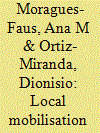| Srl | Item |
| 1 |
ID:
097271


|
|
|
|
|
| Publication |
2010.
|
| Summary/Abstract |
The region of Valencia has a marked territorial duality: an urbanised, populated and high-income coastal line, and mountain and depressed inland rural areas. This territorial duality also derives in a functional duality, so that market and regulation drivers seem to assign rural areas specific roles for the provision of raw materials, energy, water, and the like. One of the clearest examples can be found in the design and development of the Wing Energy Plan passed by the Regional Government in 2001, which designated areas for the installation of windmills. However, this regulation has resulted in an outstanding emergence of associations that have organised at several levels (from the local to the national) as a strong opposition movement to the local developments of the Plan.
With this background, the objective of this paper is to analyze, from a set of case studies, the processes of emergence and the evolution of collective actors (associations) which have been arising in many rural areas as a response to the local applications of the Wind Energy Plan. Attention will be paid to understand the tactics used, the process of adaptation to the participation mechanisms, and the role played by local and non-local networks.
|
|
|
|
|
|
|
|
|
|
|
|
|
|
|
|
| 2 |
ID:
177133


|
|
|
|
|
| Summary/Abstract |
International trade in electricity from renewable sources can offer a flexible means by which EU member states can meet their country targets but to date in Ireland initiatives to build wind farms for export have been resolutely contested by affected communities. Using a discrete choice experiment (DCE), a survey of respondents living within 10 km of an existing wind farm is conducted to estimate the social impact of wind turbines designed to produce electricity for export under different levels of financial benefit and participation. Most respondents are willing to make trade-offs to allow for an export market but financial compensation required is greater for exports compared to domestic supply. Respondents prefer greater levels of participation than currently offered but favour moderate levels of participation in the absence of financial benefits. Respondents that had a positive experience of living next to an existing wind farm in terms of financial benefits, employment and community representation are generally more accepting of wind farms. Conversely, subjects with a strong sense of place attachment or a less convincing experience in terms of financial benefits and participation were less tolerant of wind farms and more likely to pick the status quo of no new wind farm development.
|
|
|
|
|
|
|
|
|
|
|
|
|
|
|
|
| 3 |
ID:
150663


|
|
|
|
|
| Summary/Abstract |
In Ireland the deployment of onshore wind turbines has become progressively more difficult in some areas because of the potential negative externalities associated with their operation. Using a discrete choice experiment (DCE) we employ a willingness to accept framework to estimate the external effects of wind turbines on local residents with the inclusion of community consultation and to quantify the compensation required to permit wind farms to be built in Ireland. Our findings reveal that the majority of respondents are willing to make (monetary) tradeoffs to allow for wind power initiatives and we find that respondents require less compensation if provision is made for a community representative and setback distance is increased.
|
|
|
|
|
|
|
|
|
|
|
|
|
|
|
|